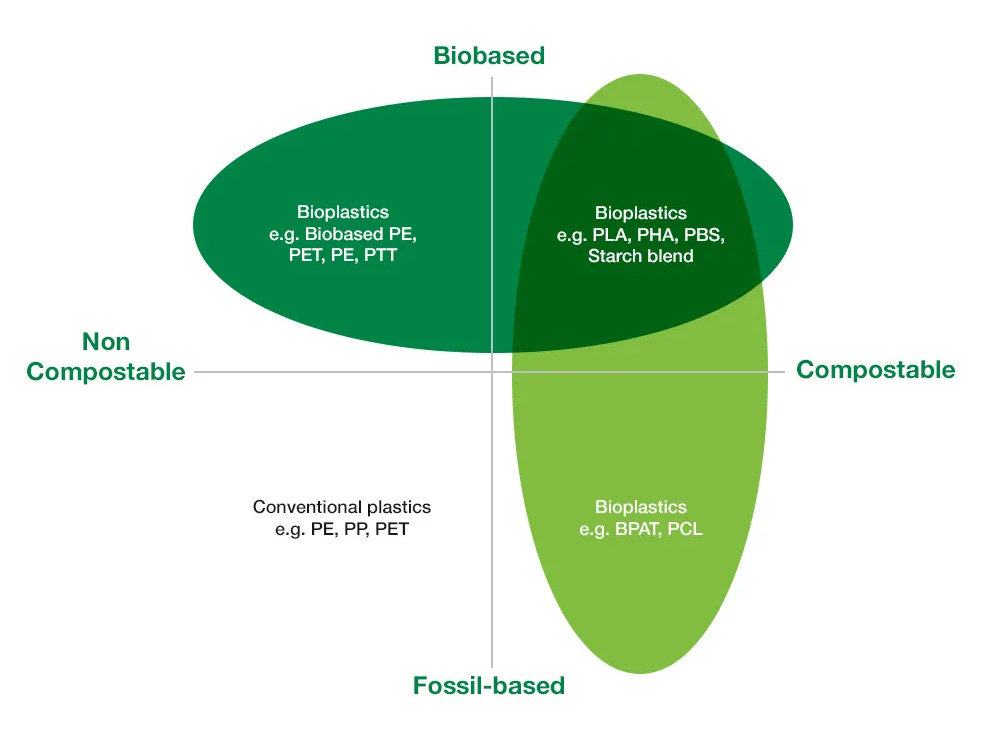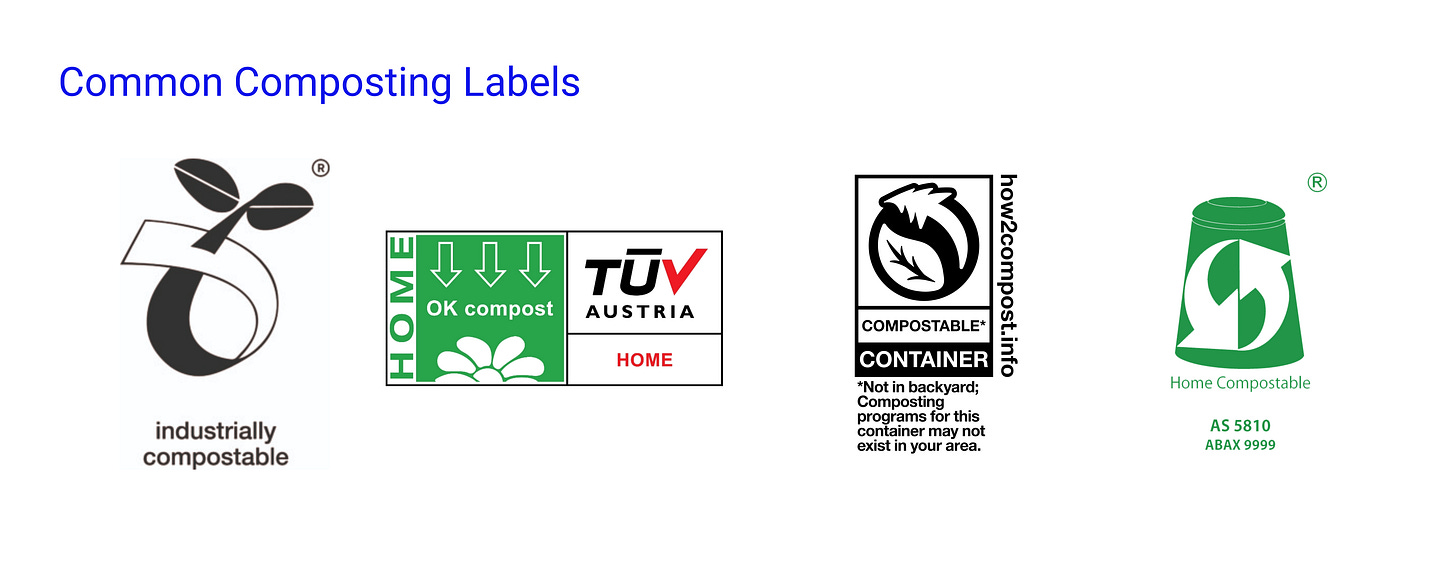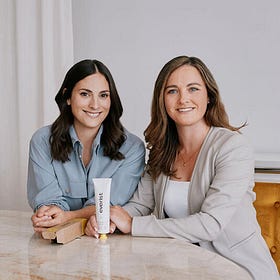⭐️ Decomposing with distinction: Compostable vs biodegradable
+ good news, upcoming events + refresh your memory on EPR
Whether forced or voluntary, you might be taking a little break from rotting your brain with short videos, and instead you’ve come here to read about rotting your packaging on Substack. Don’t worry, we’ve got you! If you’re a conscious thrower-awayer or a packaging technologist, you’ve got to know the difference between home compostable, industrial compostable and biodegradable.
If you are in the US, how has life been after a short break from TikTok? Comment below what sustainability profiles we should be following… we’re always looking for more inspo!
Keep scrolling to discover:
In Focus: Indira helps us navigate the difference between compostable and biodegradable
Our Weekly Good(s) News roundup!
Bulletin Board: 3 interesting jobs and a call for events!
In case you missed it: Our 2023 update on EPR
> A message from this week’s sponsor…
Greenly has worked with brands like LVMH, HelloFresh, L’OREAL, Lacoste and Huawei. Book a free consultation, and a demo of their software here:
> In Focus…
Biodegradable and Compostable Materials: What’s the Difference?
by Indira Ardiyatna
In the race towards sustainability, terminologies like biodegradable and compostable to describe material features often emerge as buzzwords, touted as eco-friendly solutions to the plastic packaging waste crisis.
However, these terms are sometimes used interchangeably, leading to confusion among consumers and brands. For brands who are striving to adopt greener practices, it is important to understand the differences to make informed decisions, provide accurate information to their consumers and avoid greenwashing pitfalls.
Firstly, let’s have a look at the definitions…
Biodegradable: Biodegradable refers to any material that can be broken down by living microorganisms, like fungi or bacteria, to become natural elements. There is no specific timeframe and conditions within which this process should take place. It is naturally occurring based on the chemical composition. It can take anywhere from a few days for to 500 years, especially when it comes to plastic and leads to microplastic pollution.
Compostable: Compostable means any material designed to biodegrade without leaving any toxic residue, under specific, human-driven circumstances with a specific time frame. They also must disintegrate fully, without any toxic residue left in the environment.
So how do bioplastics fit into this picture?
Biodegradable or compostable should not be confused with bioplastics: a category for plastics that are derived from plant-based materials, but they do not automatically mean it is rapidly biodegradable or compostable. The chemical structure of a material determines its biodegradability or compostability, not its origin.
For instance, fossil-based plastics like PBAT (polybutylene adipate terephthalate) or PCL (polycaprolactone) can be biodegradable within a few years. Conversely, some bio-based plastics (bio-based PET, PP) may not biodegrade for the first 450 years due to their molecular composition.

In short, the key difference lies in how clearly the end-of-life treatment is defined.
Breaking down types of compostability
While biodegradable means material can decompose in an uncontrolled environment, compostable materials require specific composting conditions. Disposal requirements for compostable materials can also differ, whether they are industrially compostable or home compostable.
Home compostable: Home compostable usually means materials can decompose at lower temperatures (20 - 30 degrees C) relying on natural microbial activity.
Industrial compostable: Industrial compostable usually needs to be in high temperatures (50-70 degrees C) and high humidity to facilitate the complete breakdown of materials.
So how can you avoid greenwashing when making or checking biodegradability and compostability claims?
For brands to be responsible in the claims that you made, you can:
Avoid broad or unqualified claims like ‘eco-friendly’ or ‘green’.
Consider whether compostability and/or biodegradability are the best choices for your product from a lifecycle perspective.
Comply and obtain certifications that prove your product meets internationally recognised compostability standards, such as the EN 13432 (EU), ASTM D6400 (US) or TUV Austria’s OK compost certification. Make sure it is very clear to consumers how they should dispose of the item.
Lastly, and this is key, consider where you’re making the claim and what the industrial composting infrastructure is, where no infrastructure is available the claim might be considered misleading.
For consumers, you can play your part by:
Read the label carefully when buying products, including disposal instructions. Consider what facilities are available to you when making your choice.
Check whether the claims are clear and substantiated - see if they have verifiable labels such as ‘Industrial compostable certified to EN 13432.’
You can also report unclear claims or actively inquire companies and brands about their products’ end-of-life treatment if you don’t know how to dispose of them.
So, ready to spot and check if products are making the right claim?
> The Good(s) News
🎯 Ettos announced its partnership with Fortude to boost sustainability across fashion supply chains, their platform helps to simplify tracking raw materials and to verify sustainability claims.
🎯 Kuishi announced their carbon-positive dispensing solutions, designed for refill, to reduce single-use plastic waste.
🎯 Vivobarefoot announced their partnership with Maersk to build a sustainable supply chain, they hope the partnership will bring faster delivery times and more sustainable product handling.
⭐️ Dutch grocery retailer Albert Heijn announced its B Corp certification with a score of 97.9
⭐️ Reiss has partnered with SOJO to offer alteration and repair services at its Kent House and Long Acre stores in London, promoting the longevity of its garments.
Have good news? Share it with us - info@followingthefootprints.com!
> Bulletin Board
Jobs in CPG x Sustainability
New York, USA - Associate Manager, Sustainability & Social Impact Reporting - Vita Coco ($80-90k/yr)
Bradford, UK - Sustainability Manager - Myton Food Group (Morrisons)
This job doesn’t strictly meet the criteria but we make the rules so we can break them 💁♀️ London, UK - Retailer Partnerships Lead - Provenance
If you want to feature your event here, get in touch or add it directly to our events calendar 👇
> Finally, in case you missed it…
🌱 Your Extended Producer Responsibility (EPR) refresh, and why Everist are concentrating on waterless products.
This newsletter focuses on the updates to the Extended Producer Responsibility (EPR) scheme, and what it means for UK businesses now
Want more? Check out our Website! You can find more about the team behind this newsletter, dig through our content archive AND check out our handy databases there too.
Have ideas for what we should write about next? Reply to this email! We’re always looking for inspiration from folks like you.
Until next time!
Team FTF






